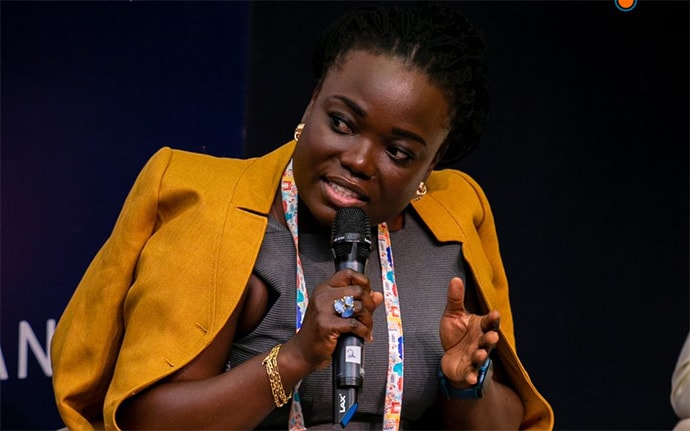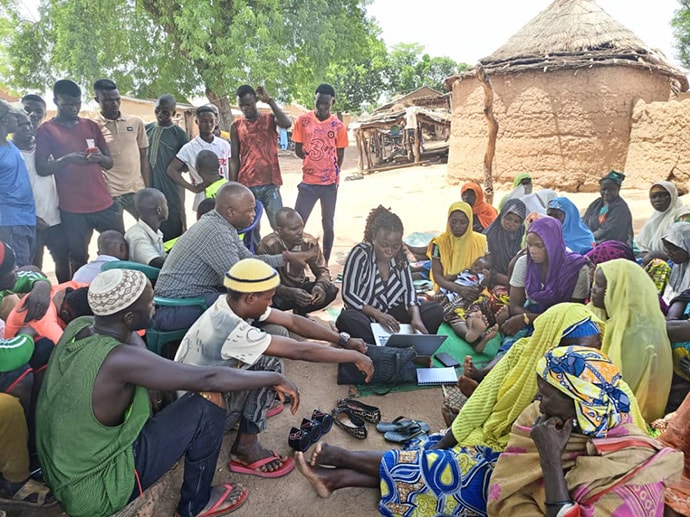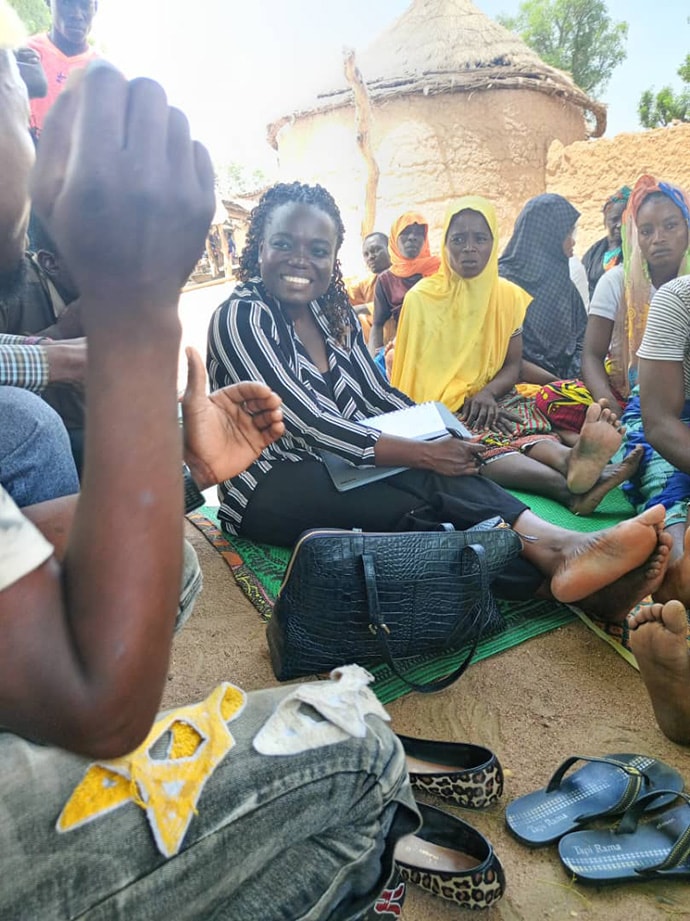
“The economic empowerment of a woman is the economic empowerment of a family and the communities that make up a nation.”
This powerful observation was shared with me by Ama Akuamoah, the Director of Market Engagement for the Digital Innovation Group at Opportunity International. I was able to connect with her while she was in Malawi, having recently visited some final-mile project locations there. We had a wonderful conversation over Zoom. She was relaxed, perhaps a bit tired being that it was the end of her (busy) day, and had a wonderful, attentive demeanor, and an infectious smile!
“At Opportunity International,” Ama said, “I have the unique role of building both internal and external partnerships to expand digital products and services to develop economic pathways out of poverty and improve the livelihoods of clients in various markets that we operate in Africa, also in India and Indonesia.”
Among its myriad of services, including work in agriculture and education finance, Opportunity International designs, develops, and deploys different digital products to support their hardest to reach clients. Using a human-centered design approach, their Digital Innovation Group has produced varying interventions to support savings groups, train banking agents, and connect farmers to critical information—including AI-based products and services.
Ama shares, “‘The future is here but it’s not evenly distributed,’ a quote from William Gibson, resounds loudly in our organization.” In Ama’s over a decade’s experience that spans 4 continents, she observed that “while we see how technologies are abounding in different parts of the world, it’s not evenly distributed in the places that we work in, especially at the last mile. We want to ensure that innovation is relevant, accessible, and affordable for people who live in the poorest communities across the world. We particularly focus on women who unfortunately are often excluded from the benefits of innovation.”
Ama continued, “These last-mile clients face significant barriers such as poor infrastructure, limited access to financial services, underdeveloped markets, and service economy and for women this is compounded by gender-related social norms that limit their agency and upward mobility in life. To be able to do this work means that I’m getting to support these women, and that’s very exciting for me.”

Ama working with farmers in Nigeria. Photo: Opportunity International
*****
From a young age, Ama was heavily influenced by her mother to be strong, flexible, and to help others.
“She was, and is still, a force to reckon with,” Ama says with a big smile. “Single handedly raising three children, she exemplified for me resilience, how to pivot in any situation, and how to never allow anyone or anything to stand in your way. She epitomized for me what change being your constant was like because she went through different stages in her life and her career. But in all of it, she was still stoic.”
And with all that strength, Ama said, there was a soft, generous side, too, which heavily influenced Ama’s values.
“She will feed everybody and anyone, and now that I look back as well, people whose circumstances were not very different from ours, but who had hit hard times. She always found a way to help,” reflected Ama. “So, I believe that when I started working in advocacy for children’s rights, when I was around age 12, it was probably the natural progression from what I’ve seen happen in my in my home.”
She joined a group of young people in Ghana -the Curious Minds, “a platform working to ensure the inclusive participation of young people in the decision-making processes that affect their lives.” As part of this advocacy work, Ama represented Ghana as part of the children’s delegation to the first ever United Nations General Assembly Special Session for Children (UNGASS) in 2002. This first of a kind global gathering brought world leaders, and stakeholders with vested interests in promoting the wellbeing of young people on how to create a world fit for children. For Ama, interacting with other advocates like her from other countries left an indelible link on her perspective of the power of a connected world working in unison to solve the biggest challenges that face us all. Global development to her was a career choice. It was a natural progression “from being in a home where helping other people was exemplified for me through my mother,” to working now on a larger scale with a bigger impact.
Throughout her early professional years Ama had many mentors that pushed her in the direction of international development, from UNICEF where she interned during her gap year after secondary school before heading to university, to Al Jazeera English’s London office, “these mentors opened doors, believed in me, and pushed me in the direction of opportunities for career development. I am eternally grateful to them.”
Through these earlier job opportunities and embracing what she learned by example through her mother, she kept being reminded how when you empower a woman with economic opportunity, you empower a community. This is what brought her to work with Opportunity International.
“I saw how my mother and other traders in Makola Market pulled together and supported each other economically because formal financial services were not always accessible to them. To work with Opportunity International now to enhance access to formal financial services for so many of our clients who are female and in informal economic activities—this work is very important to me.
Ama also realizes the tapestry of her education, career path, and life experiences are privileges she does not take for granted. “And I believe that to whom much is given, much is expected. I don’t take my privilege for granted – that which I’ve been given in terms of my resources, my knowledge, my experiences, I deploy to serve others, so that none of it would be wasted.”
For Ama it has paid off, time and time again. Through the programs and technology Ama helps Opportunity International deploy, such as the digitization of Savings Groups, these women have more time on their hands to expand their businesses and support their families. It is this equitable distribution of technology that solves the pain point of so many that she hopes to make possible on a wider scale.
“To see the smile on our clients’ faces is pivotal for me,” she said with her own big smile. “Working with the digital innovations group and the wider Opportunity International colleagues, I’m very privileged to be able to put my skill set into making that happen, and also to see that kind of impact.”
*****
I asked Ama, what are one or two of the digital projects she is working on that she’s excited about?
“Oh, gosh! I could talk of so many initiatives happening across the wider Opportunity International organization! The current work on digitizing savings groups is one l am closely involved in together with other colleagues from the Agriculture Finance team.”
The savings groups she visited in Malawi had been restricted in what they could do as their ledgers were paper-based and therefore, among other challenges, Financial Service providers found it difficult to create linkages to support their activities or extend tailored services and products.
“Through a partnership with DreamStart Labs using their DreamSave app, we’re digitizing the ledger of the groups and for financial service providers (FSPs) the data from Dream Insights means they are to be able to see transactions of the group and understand better group operation. Analyzing this data, FSPs for example can extend credit to the group and support the expansion of the economic activities of the members.”
This builds history and trust, without the FSPs having to travel miles on either a weekly or fortnightly basis to these groups, which also reduces the operational costs. The savings groups can access mobile money, apply for and receive (and pay off) micro-loans, and inject more money into the group–all which helps these women improve their livelihoods and their communities.

Ama working with farmers in Nigeria. Photo: Opportunity International
Another initiative Ama is excited about is their Women as Agents of Change program in India.
Due to cultural and social norms, women did not feel comfortable accessing financial services from men – and the banking correspondent agents were almost entirely male. The Indian government, to improve access to finance for women, has supported a program to create bank sakhis – women who are trained as bank agents who are in rural areas to provide bank services to the last mile clients who are also women.
The Agents of Change program recruits and trains entrepreneurial women to become banking agents who work from small shops or offices and earn commissions on transactions. Equipped with tablets or smartphones to provide banking services to these hard-to-reach communities, this network of female banking agent connects rural women to financial services—and does so with remarkable success.
Ama elaborated, “In cultural contexts where women face social cultural barriers that hinder their access to formal finance, or view their savings are too small to bother walking long distances to deposit in a bank, having a female bank agent in their locality who can deploy such services becomes a lifeline to economic empowerment. Using AI, a chatbot is in the works to make the certification process easier for the women entrepreneurs, again built on the premise of saving them time and providing learning opportunities that fits around their busy schedules.
These sakhis also become a source of inspiration for other women. Women see the success of these women bank agents and say, “‘I can also take up this role,’ and they become entrepreneurs on their own, because these women then make their own money. They have built their businesses, and other women see them and say, I can also do this if this person has done this, so it’s very, very core to the work that we do.”
Lastly, Ama talked about Ulangizi, an AI-driven chatbot available via WhatsApp, “that we give to our Farmer Support Agents who are local small holder farmers we equip to support others in their community and provide extension services in their local language. Because it’s on WhatsApp, you can send photos and it tells you what sort of disease is affecting your crop, for example. It takes a limited service in most of these rural areas in terms of extension services, and it brings it right to the doorstep of the farmer. We have successfully piloted Ulangizi and look forward to scaling and replicating the tool in other countries and languages”
You can see a presentation about Ulangizi as recorded at our Goalmakers 2023 conference and presented by Paul Essene, Sr. Director, Product & Technology Innovation, Opportunity International: click this link and fast-forward to 9:25.
*****
We shifted our conversation to how there is so much happening in the world right now that affects local (and global) economies, such as climate change, shifting politics, and conflict, and I asked her how she felt about this.
“I believe that with every challenge comes on opportunity,” she said, “and I thank my mother for that [chuckle].”
And its people who give her the most hope: “Especially young people, and their passion to be the change they want to see.” In Africa she observes how young people are forging their paths for the future of the continent they want. “They are moving the needle to the best of their ability, utilizing diverse technology to impact their communities – one step at a time.”